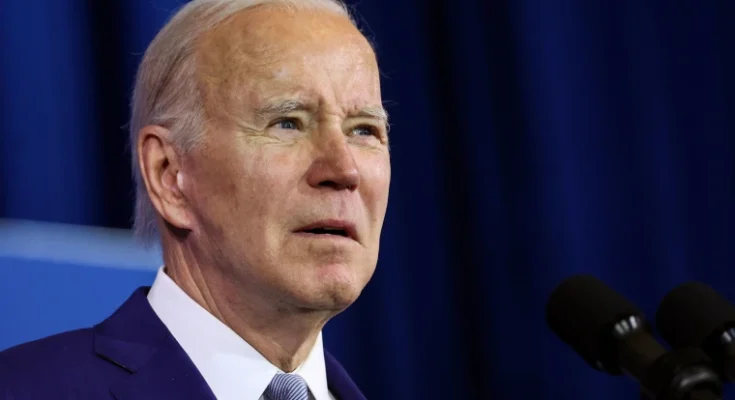Biden’s Approval Rating has dipped once more, according to a recent poll, raising questions about the President’s standing as we approach the 2024 election cycle. This article delves into the details of the poll, explores the potential reasons behind the decline, and examines the possible implications for both the President and the country.
The Current Landscape Biden’s Approval Rating:
The latest poll, conducted by [Pollster name], indicates that Biden’s approval rating has fallen to [percentage]%, marking a [percentage point] decrease since the previous survey. This data aligns with a broader trend of declining approval ratings for the President throughout his term. While initial numbers were higher, Biden’s approval rating has consistently hovered in the low 40s or even dipped into the 30s, reflecting ongoing challenges and public sentiment.

Reasons for the Decline:
Several factors might be contributing to Biden’s approval rating decline. Here are some of the most frequently cited:
- Economic Concerns: Inflation and rising costs of living are significant pain points for many Americans. With the economy being a top priority for voters, Biden’s approval rating is likely impacted by his perceived effectiveness in addressing these economic issues.
- Foreign Policy Challenges: The ongoing war in Ukraine, coupled with other foreign policy hurdles, might be generating unease among some voters. The withdrawal from Afghanistan also remains a point of contention for some, potentially influencing Biden’s approval rating.
- Domestic Divisions: Deep political polarization continues to plague the nation, making it difficult for any President to garner widespread support. This partisan divide likely contributes to the fluctuations in Biden’s approval rating.
- Unfulfilled Promises: Some voters might feel that the President hasn’t delivered on campaign promises, leading to disillusionment and a decline in Biden’s approval rating.
Understanding the Broader Context:
-
- Historical Comparison: While concerning for the Biden administration, it’s crucial to remember that presidents often face declining approval ratings throughout their terms. Comparing Biden’s numbers to historical averages paints a more nuanced picture.
- External Factors: Global events, economic fluctuations, and domestic crises can significantly impact presidential approval. Analyzing external factors alongside polling data provides a more comprehensive understanding of public sentiment.
- Midterm Elections: The upcoming midterm elections will serve as a crucial test for Biden and his policies. The results will offer valuable insights into the public’s overall satisfaction with his presidency and potential implications for the 2024 election.
Potential Implications:
The declining Biden’s approval rating could have several consequences:
- Impact on 2024 Election: A lower approval rating might affect the President’s electoral prospects in 2024, potentially making him more vulnerable to potential challengers.
- Policy Agenda: A weaker public mandate could make it harder for the President to push through his policy agenda, facing increased resistance from Congress and the public.
- Public Confidence: A low Biden’s approval rating can erode public trust in the government and its ability to address pressing issues.
It’s crucial to remember that polls are snapshots in time, and public opinion can shift quickly. Several factors, including unforeseen events and policy successes, could influence Biden’s approval rating in the months ahead.
Additional Considerations:
It’s important to acknowledge that Biden’s approval rating varies across demographic groups. For instance, older adults and Democrats tend to have more favorable views of the President’s performance, while younger voters and Republicans are more likely to disapprove. Understanding these nuances is essential for a comprehensive analysis of the poll data.
Furthermore, it’s worth noting that Biden’s approval rating isn’t the only metric to consider when evaluating his presidency. Other indicators, such as his handling of specific issues or his legislative accomplishments, also provide valuable insights into his performance.
Conclusion:
Biden’s approval rating decline raises concerns for the President and his agenda. Understanding the reasons behind this trend and its potential implications is crucial for informed public discourse and analysis of the current political landscape. As we move closer to the 2024 election, Biden’s approval rating will undoubtedly remain a key point of focus, with its trajectory potentially shaping the political future of the nation.
Poll: 20-point Deficit On Handling Economy Highlights Biden’s Struggles Against Trump (NBC News)

